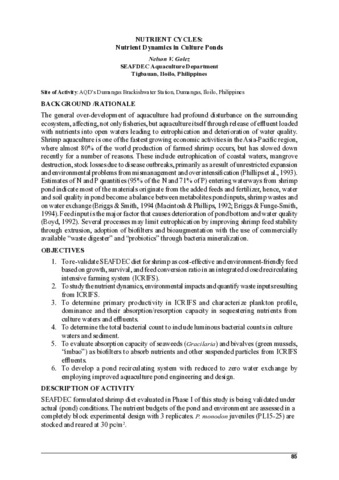Nutrient cycles: Nutrient dynamics in culture ponds.
- Global styles
- MLA
- Vancouver
- Elsevier - Harvard
- APA
- Help

Date
2004Author
Page views
3,290ASFA keyword
AGROVOC keyword
Taxonomic term
Metadata
Show full item record
Share
Abstract
The general over-development of aquaculture had profound disturbance on the surrounding ecosystem, affecting, not only fisheries, but aquaculture itself through release of effluent loaded with nutrients into open waters leading to eutrophication and deterioration of water quality. Shrimp aquaculture is one of the fastest growing economic activities in the Asia-Pacific region, where almost 80% of the world production of farmed shrimp occurs, but has slowed down recently for a number of reasons. These include eutrophication of coastal waters, mangrove destruction, stock losses due to disease outbreaks, primarily as a result of unrestricted expansion and environmental problems from mismanagement and over intensification (Phillips et al., 1993). Estimates of N and P quantities (95% of the N and 71% of P) entering waterways from shrimp pond indicate most of the materials originate from the added feeds and fertilizer, hence, water and soil quality in pond become a balance between metabolites pond inputs, shrimp wastes and on water exchange (Briggs & Smith, 1994 (Macintosh & Phillips, 1992; Briggs & Funge-Smith, 1994). Feed input is the major factor that causes deterioration of pond bottom and water quality (Boyd, 1992). Several processes may limit eutrophication by improving shrimp feed stability through extrusion, adoption of biofilters and bioaugmentation with the use of commercially available “waste digester” and “probiotics” through bacteria mineralization.
Suggested Citation
Golez, N.V. (2004). Nutrient cycles: Nutrient dynamics in culture ponds. In: Promotion of mangrove-friendly shrimp aquaculture in Southeast Asia (pp. 85-93). Tigbauan, Iloilo, Philippines: Aquaculture Department, Southeast Asian Fisheries Development Center.
Type
Meeting reportCollections



